How to Enforce a Divorce Decree in Maryland

If your ex-spouse is choosing not to comply with the court-ordered terms of your divorce, you have several options for seeking enforcement. Whether the violated terms of your divorce relate to property division, spousal maintenance, or child custody or support, an experienced Maryland divorce attorney can guide you through the legal process for ensuring that your rights and privileges as spelled out in the divorce agreement are honored.
At the McKeon Law Firm, our divorce lawyers have extensive experience in all areas of family law. We know that getting your divorce finalized was likely a difficult and emotionally taxing process, and we understand the stress it causes when your ex-spouse does not comply with the carefully negotiated divorce terms. In these cases, it’s important to act quickly so that your rights are protected, so contact us at your earliest convenience for a consultation with an experienced divorce attorney in Maryland.
What is a Divorce Decree?
A divorce decree is an order by the court that spells out the details of the divorce. This may include division of property and assets, payment of alimony and child support, and child custody and visitation arrangements. Although a divorce decree is legally binding for both parties, sometimes one party fails to comply. If this happens, various judgments can be made against them under state law.
How is a Divorce Decree Enforced?
Maryland courts require strict compliance with divorce terms. Your attorney has several options when it comes to ensuring that your former spouse adheres to those terms, and will decide which to deploy based on which terms are being violated. Some of the most common areas of enforcement are:
Division or transfer of assets
A divorce decree often involves the transfer of assets, such as the title on a house or car, or a portion of a retirement account. If a divorcing spouse fails to follow these orders, the court can appoint a third party to complete the transfer of title. If the offending spouse draws down or sells an asset that is being divided in the divorce, the court can order payment or seize the assets from the non-paying spouse.
Child or spousal support
A divorce decree may include the payment of child or spousal support. If a divorcing spouse has the ability to pay as ordered and does not do so, they can be found in contempt of the court. A lien can be placed on their property, and they can be punished with fines or even jail time in extreme cases.
Child custody or visitation
Child custody and visitation are almost always part of a divorce decree if the divorcing couple has children. If one parent intentionally denies court-ordered custody or visitation to the other parent, a judge can order make-up time or modifications to the order to ensure future compliance.
Enforcement of any terms of a divorce decree involves legal processes and fees. The court will often order the offending party to pay all the attorney and court fees that you accrued during the enforcement process.
How the McKeon Law Firm Can Help
Filing a motion for enforcement of a divorce decree involves identifying the exact terms that are being violated, providing evidence of the violation, and requesting that specific actions be taken against your ex-spouse to force their compliance. An experienced Maryland family law attorney has the knowledge to advise you on your options and effectively advocate for your rights.
At the McKeon Law Firm, we focus solely on family law and have extensive experience with complex divorce cases. Our attorneys combine professionalism with a personal touch and take a hands-on approach to each case we handle. We are not only experienced in the courtroom, but also experienced as spouses and parents. Find out exactly how we can help you by contacting us today.



